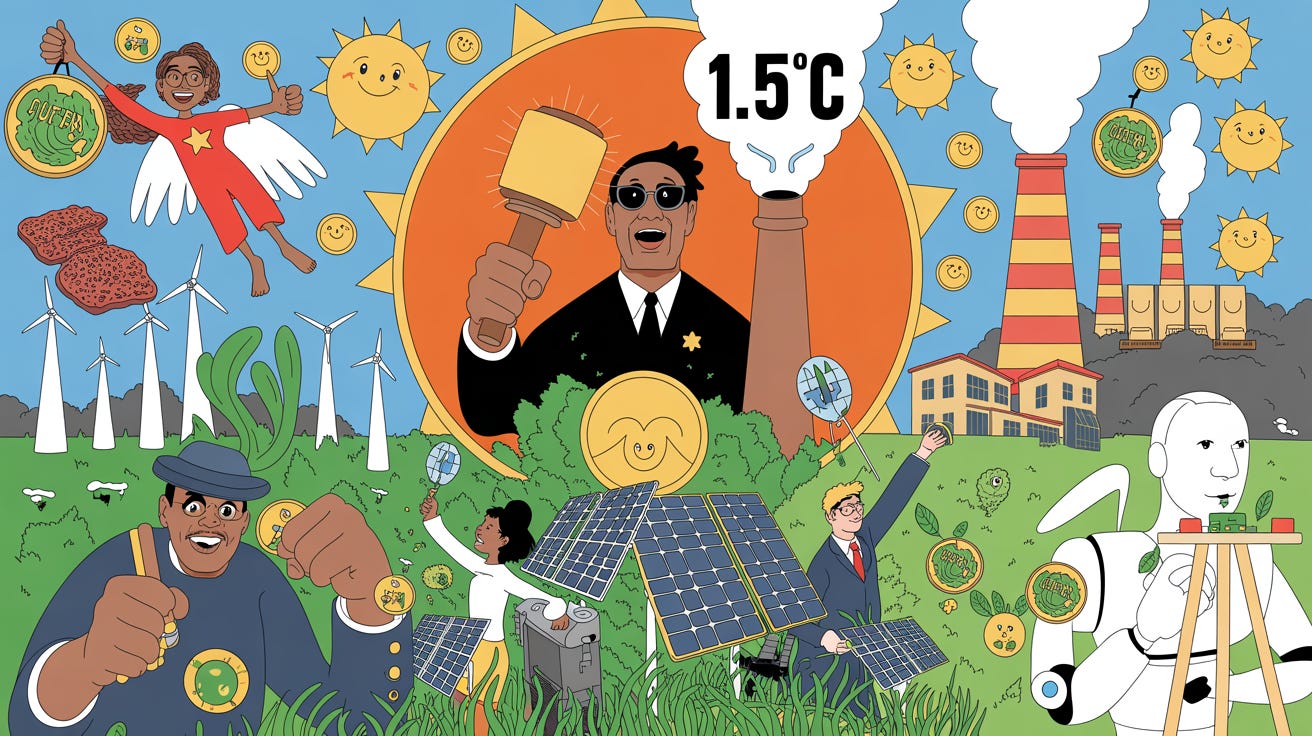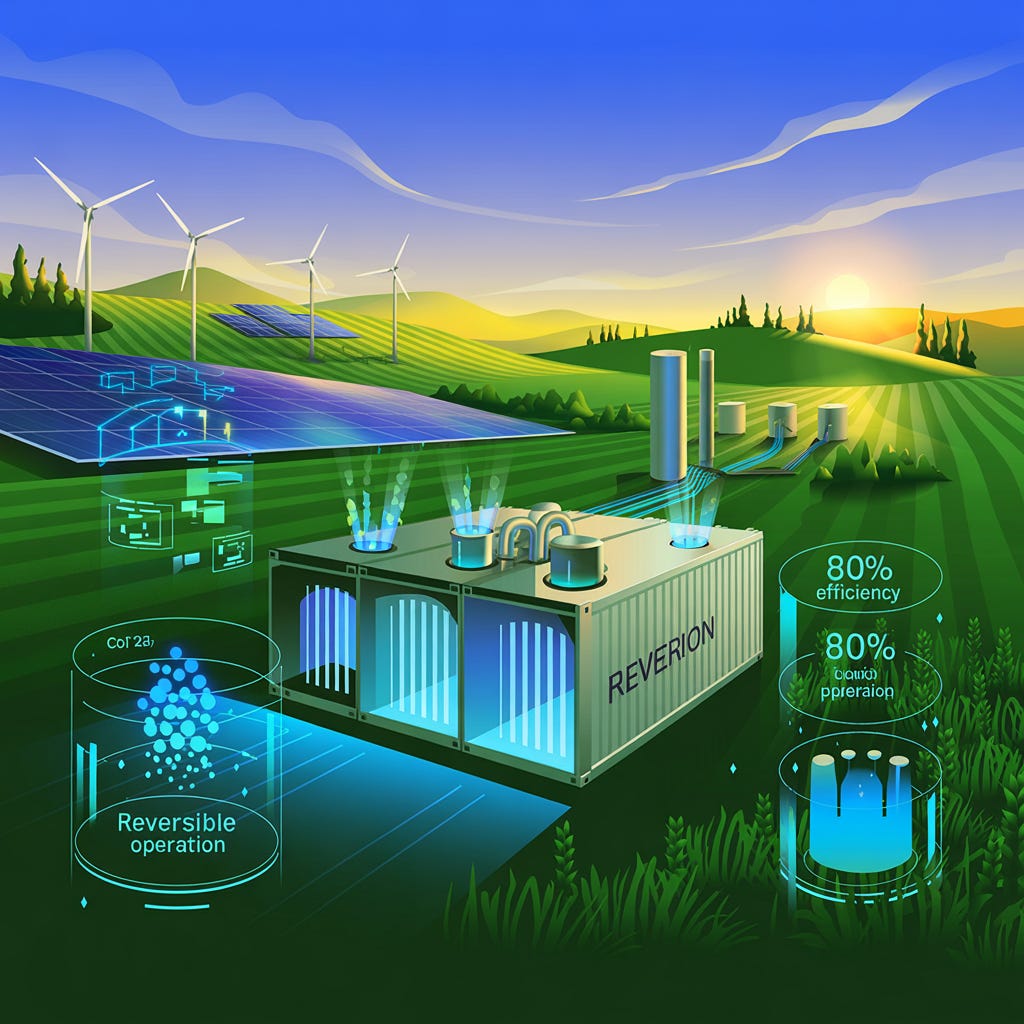Samuel L. Jackson Gives CO2 the Finger (and Eats Seaweed Chips) 🌊🍘
This week: ICJ turns the legal heat to 11, climate scientists fight DOE, UK Pension Fund goes green and Arctic ice is melting + shoutout to Reverion
Happy Saturday! Welcome to the time machine, where we look at the past week and try to pretend things are normal.
The Reconfiguration, folks, is not stopping. Honestly, I had a real hard time deciding what to leave out of this edition. From climate-induced inflation to yet another episode of the great climate policy reversal, climate change is driving many actions forward (and backwards).
In many ways, climate change shapes your life more than you realize. Its impact often hides in everyday events, ranging from extreme weather to policy shifts and big tech moves. It’s just not always easy to spot, making it critical to look past the headlines if you want to understand and even benefit from our changing world.
Every week I try to find the hints, the clues and the signs that will give you a peek behind the curtains, and will tell you why you should really care about this, even though it sounds boring.
If you also see important little pieces of the puzzle, let me know - I’d love to get recommendations and topics to write about!
The Bigger Things
ICJ Ruling Turns the Heat to 11👩⚖️:
What Happened? Remember the landmark ICJ ruling from last week? Yes, the one where the ICJ ruled that states have an obligation to protect the climate. Guess what? Lawyers have started using the court’s opinion as quickly as a day after it was issued, relying on it for cases in Ireland, Netherlands and elsewhere.
Why Care?🤷♂️ Because the wheels of justice, apparently, grind relatively quickly in this case. The ICJ’s opinion may change the global legal landscape, potentially bringing a slew of victories to climate advocates against governments and energy companies alike. It’s not clear how this ruling will impact cases in the US, but elsewhere the ruling is expected to be significant. The consequences will be felt by all of us (especially you), as policies and energy markets may be significantly affected.
Department of Energy Issues Report, Climate Scientists Fight Back🥷:
What Happened? The fight is on: Department of Energy has issued a new report about the impact of greenhouse gases, authored by five climate skeptics, finding that human-made climate change isn’t all that bad. This report prompted leading climatologists to organize a swift response rebutting it, while others stating that the report “twists their work”.
Why Care? 🤷♂️ Because it looks like scientists have had enough and are now trying to push back against what is perceived as an “antiscientific” and “deceptive” report. This reaction joins ongoing evolution of steps and reactions by the scientific community to the current Administration’s policies. This suggests a shift in tone and approach by what is usually a community that is relatively noncombative.
Climate Change is Causing Inflation?📈:
What Happened? Climateflation is a real thing, according to a report from the Autonomy Institute. The report projects U.K. food prices could jump 34% by 2050 as heatwaves and droughts hit global harvests, putting up to 915,000 Brits at risk of being pushed into poverty by weather-driven inflation.
Why Care?🤷♂️ Because, if you live in the UK, you’ll be the one paying the price 🫰💸. This report shows quite forcefully how climate change can raise prices dramatically by 2050, thanks to expected shocks to food sources (think heatwaves affecting wheat) and supply chains (think exporters in other countries suffering from flooding). There is plenty more vulnerability that lies in the heart of global food systems, and they are likely to be hit hard by climate change.
The Smaller Things
UK’s People Pension is Going Green 🟩:
What Happened? The People’s Pension announced the biggest single green shift by a British pension fund, moving £15 billion of assets into strategies aligned with the Paris 1.5 °C goal, immediately cutting the portfolio’s carbon footprint by 30 percent and divesting from thermal-coal producers.
Why Care?🤷♂️ Because every time a pension fund goes green, an angel gets their wings. And in all seriousness, despite the recent withdrawal of large financial institutions from Net-Zero clubs and an anti-ESG sentiment, many serious institutions still believe going green is the right way to go. The Reconfiguration of the financial sector is still very much happening, with financial institutions reacting in different ways to climate change.
Niagara Falls Are at Full Capacity Thanks to Manitoba Wildfires🔥:
What Happened? Uncontrolled fires in northern Manitoba forced more than 17,000 people to move (that’s in Canada if you were wondering). With all local shelters full, Ontario rushed to open about 1,000 hotel rooms in Niagara Falls, where hundreds of evacuees are now housed while fires continue to rage back home.
Why Care? 🤷♂️ Because we are going to see this happen a whole lot more often, as extreme weather becomes more common. Eventually, someone will have to foot the bill, and it just might be you (think higher room rates). You see, overwhelmed infrastructure (housing in this case) will likely mean that highly popular destinations like Niagara Falls will either decline in quality or become more expensive.
You Can Now Dig in the Arctic with a Spoon😰🧊:
What Happened? New reporting by Grist discusses record-shattering warmth that took place in February 2025 in Svalbard, Norway. The heat was so extreme that scientists could use spoons to dig into ground that is normally frozen solid.
Why Care? 🤷♂️ Because it is another important reminder of just how fast the Arctic’s Reconfiguration is taking place. Record-shattering heat in winter shows how lofty predictions of melting ice and rising temperatures materialize. Heatwaves like this help show exactly why nations are so interested in the region and just why the Arctic is the scene of intense global competition.
The Cooler Things / Something Odd
Pulp Fiction <3 Wind Farms 🎐: Samuel L. Jackson really loves wind farms, apparently. In a new commercial he made for Vattenfall, Jackson extols the virtues of wind farms in his eloquent and unique style:
“Rising out of the ocean like a middle finger to CO2”
Jackson also offers you a chance to eat seaweed chips that grew on a wind farm. Yum… I guess?🤷♂️
Jackson, who is one of my favorite actors, is not the first, and definitely not the last, big-ticket actor to participate in the climate debate, using his stature to promote renewables and pro-climate agenda (personally I love it). Still, it does signal a Reconfiguration of the climate debate, with Big-Whigs entering the arena. Stay tuned, I’m going to write some more about it soon.
AI-ify the News
As always, here’s an AI-generated picture that should somehow summarize the news. Whether it’s successful or not is up to you to decide.
Reverion
You're running a biogas plant on your farm. You've invested good money into this thing, but honestly, the returns are... meh. You just can’t seem to get much out of your plant, and to make matters worse, that CO2 just goes straight into the atmosphere. 🤦♂️
You want to do something about it, but it doesn’t seem like there’s much you can do without eating up the rest of your savings.
Well, it's your lucky day. Meet Reverion.
Reverion developed something wild: a reversible power plant that can switch between generating electricity and storing energy in under 60 seconds. Their solid oxide fuel cells achieve 80% electrical efficiency. When there's surplus renewable energy in the grid, their system automatically flips to electrolysis mode and produces green hydrogen or synthetic methane.
Why care, you ask? Reverion helps biogas operators like you maximize their returns by giving...
80% electrical efficiency compared to 40% from conventional gas engines, doubling electricity output from the same biogas
Reversible operation that switches between power generation and energy storage in under 60 seconds
Pure biogenic CO2 capture ready for use or for permanent storage
What I like about Reverion’s solution is that they help turn biogas on its head: Instead of being a source of wasted energy, heat, and carbon emissions, they enable better use of heat and carbon, helping accelerate the climate transition.
To me, Reverion’s solution is an excellent example of how to leverage the Reconfiguration. The growing need to decarbonize creates a market for more efficient solutions and pressures existing energy sources (like biogas) to do better. The rewiring of the energy sector is creating an opportunity to serve sectors that are trailing behind. The Reconfiguration creates ripple effects across value chains, and Reverion seems to have identified a very interesting one that has a potential to impact an entire sector.
That’s it for this edition of News Reconfigured.
Stay tuned for my new hot take on Tuesday, and see you soon next week!
…oh, and don’t forget to subscribe - it would mean a lot! 🔽







